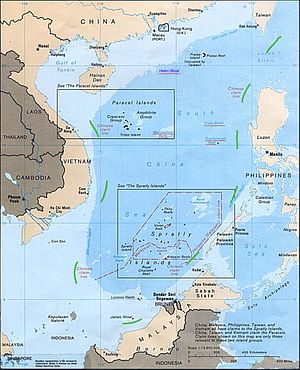Late this summer, or possibly early in the fall, the Netherlands-based Permanent Court of Arbitration (PCA) is expected to hand down a verdict on the merits of the Philippines’ case against China over the status of various features in the South China Sea. The case won’t rule on the sovereignty of those features, but, where the court has jurisdiction, its decision will decide the maritime entitlements of various features. Beyond the legal effects of the decision, which will be a major milestone in the evolution of the disputes in the South China Sea, the case is expected to go in Manila’s favor on almost all counts and deliver substantial reputational costs for China.
Ahead of the highly anticipated decision, Beijing has been hard at work trying to get states–both regional and extra-regional–to voice support for China’s position on the South China Sea, which is basically that there’s no need to get an international body involved and that the disputes should be resolved on a bilateral basis, through negotiations. Unsurprisingly, the bilateral approach handily benefits China, which can swing its weight as a large and powerful country against comparatively smaller and weaker claimants (such as the Philippines, for instance).
China hasn’t been too transparent in outlining just who supports its position on the South China Sea disputes though. My colleague Shannon Tiezzi, in a recent issue of the Diplomat‘s magazine, outlines some of the initial attempts. In several cases, China has simply issued readouts of diplomatic meetings, noting that the countries it conferred with voiced support for its South China Sea position, without directly quoting any senior officials. What’s even more puzzling is that in a press conference yesterday, Lu Kang, a spokesperson for the Chinese foreign ministry, when asked how many countries supported China’s position, cited the number 60, which a journalist had mentioned in a prior question. China’s offered similar numbers in the past, but even its foreign ministry spokesperson doesn’t have a clear idea of exactly who backs its position.
A new resource compiled by the good folks over at the Center for Strategic and International Studies’ Asia Maritime Transparency Initiative (AMTI) helps clear the waters considerably, providing a four-tier list of countries that a) publicly have come out to support China’s position; b) states that China has claimed support its position but have yet to publicly clarify; c) states that have publicly denied support China’s position (in some cases, after China noted that they support its position); and finally, d) states that have come out and said that the PCA’s verdict will be a binding international legal decision (such as the United States). Above all, AMTI’s tracker provides primary source support for the status of these states’ support or lack thereof for China’s position.
The critical list for Beijing–the list of states that have publicly voiced support for its position–isn’t mighty impressive, containing just seven states. Two states–Afghanistan and Lesotho–are landlocked. The others on the list include Gambia, Kenya, Niger, Sudan, and Vanuatu; with the exception of Vanuatu, all the other states are far removed geographically from the South China Sea and have more to gain by placating China over this issue than rebuking Beijing.
There are good reasons to believe that China will care about perceptions and reputational costs in the aftermath of the PCA’s decision. Between now and the release of the decision (or immediately thereafter), more states may well come out and voice their support for China’s position, but for now, Beijing doesn’t look like it has too many explicit backers.
































